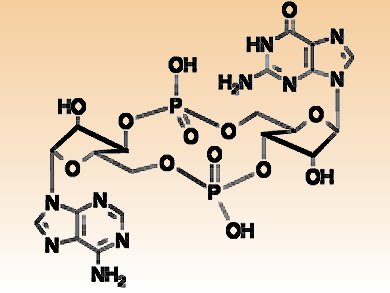During infections, bacteria and viruses introduce their own genetic material into host cells. Via mechanisms not fully elucidated, microbic DNA molecules are perceived by the infected cells as a danger signal which activates the immune system.
Lijun Sun and Jiaxi Wu, University of Texas Southwestern Medical Center, USA, and colleagues identified the protein that senses foreign DNA molecules thereby triggering the host defense response. The researchers demonstrated that an enzyme called cyclic guanosine monophosphate–adenosine monophosphate synthase (cGAS) binds to microbic DNA and synthesizes cGAMP (cyclic guanosine monophosphate–adenosine monophosphate, pictured). This dinucleotide, in turn, activates the production of inflammatory molecules aimed at combatting the infections.
cGAMP could be, thus, used as an endogenous molecule to stimulate the immune system during immune therapies or vaccination protocols.
- Cyclic GMP-AMP synthase is a cytosolic DNA sensor that activates the type I interferon pathway,
L. Sun, J. Wu, F. Du, X. Chen, Z. J. Chen,
Science 2013, 339 (6121), 786–791.
DOI: 10.1126/science.1232458 - Cyclic GMP-AMP is an endogenous second messenger in innate immune signaling by cytosolic DNA,
J. Wu, L. Sun, X. Chen, F. Du, H. Shi, C. Chen, Z. J. Chen,
Science 2013, 339 (6121), 826–830.
DOI: 10.1126/science.1229963




